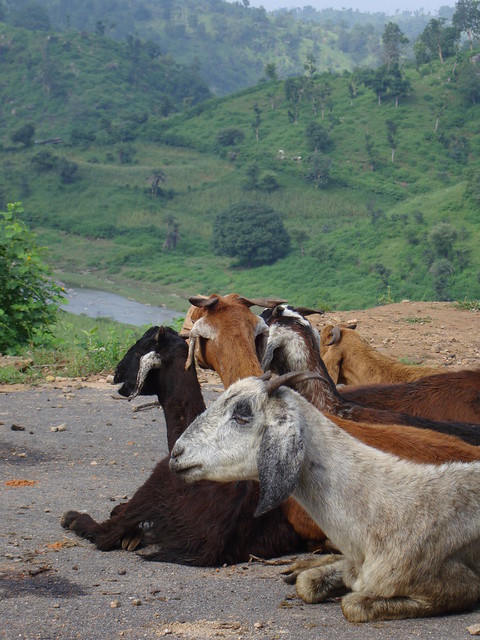Goat herd resting before going out for a day's grazing in Renoje Village, 1.5 hours drive south from Udaipur, in southern Rajasthan. ILRI scientists are conducting case studies on the use of stover and other crop wastes for feeding ruminant farm animals in India and Bangladesh. The residues of grain crops after harvesting, which make up more than half the feed for camels, cattle, buffaloes, goats and sheep, are vital to animal husbandry in these and many other developing countries (photo by ILRI/MacMillan).
Placing ecosystems at the heart of food security efforts can improve the productivity, resiliency and long-term sustainability of food supply systems. This is one of the key messages emerging from a new multidisciplinary collaboration led by the United Nations Environment Programme.
The collaboration brings together organizations working in the fields of livestock, fisheries, environment, water and agriculture to synthesize knowledge into options to alleviate hunger.
Ecosystems provide food both in its natural state (e.g., capture fisheries, forest products) and in more managed landscapes (e.g., crop systems, livestock, aquaculture). Climate change and overexploitation, especially of water resources, threaten the productivity of ecosystems. And because most of the world’s poor are directly dependent on both natural and managed ecosystems for food, they are the most vulnerable to environmental degradation and climate-related shocks.
Ecosystems also provide a host of services fundamental to food and water security. In particular, many ecosystems provide water management functions that are crucial to a stable food supply—these include water storage, purification and regulation functions as well as flood control. Ecosystems also need water to support their functioning, but many countries currently don't consider ecosystems a water user at all, much less a 'privileged' water user.
To keep up with food demand, water withdrawals from rivers and lakes will have to increase by an estimated 70–90% by 2050 and large tracts of forest and grassland will have to be converted to agriculture. The ecological fall-out from such a course of action would be catastrophic. Continued decreases in ecosystem services have already begun to hurt agricultural productivity.
Only by treating healthy ecosystems as fundamental to healthy food systems will it be possible to create systems that are not only more sustainable, but also more productive, resilient and diverse.
What this will take
(1) Shift the focus of agricultural development from protecting discrete ecosystems to managing larger landscapes.
Address these larger landscapes as bundles of interlinked services and ecosystems supporting food production. Expand the role of ministries of environment in bringing ecosystem services to the forefront of food security policy and planning.
(2) Ensure water for ecosystems and ecosystems for water.
Adequately value ecosystems services when allocating resources and planning water and land development. Avoid making unintended tradeoffs—particularly those that harm food and water security. Consider quality as well as quantity requirements of different water users to reveal options for reducing fresh-water withdrawals from the environment and getting more benefit per drop.
(3) Do more than improve 'water efficiency' in agriculture.
Without attending to allocation of water 'saved' to downstream ecosystems, improving water efficiency can end up doing more harm than good. Widen the focus on crop-based systems to include forests, livestock and fish. Place greater emphasis on managing water stored in the soil profile.
These three recommendations are described in detail in a forthcoming report, 'Ecosystems for water and food security', whose development was coordinated by the International Water Management Institute. Contributors to the report include: the Arava Institute for Environmental Studies, the Convention on Biological Diversity, the Challenge Program on Water and Food, EcoAgriculture Partners, the Interdisciplinary Centre for Environment and Society at the University of Essex, the International Livestock Research Institute (ILRI), the Institute for Land, Water and Society at the Charles Sturt University, the International Soil Reference and Information Centre–World Soil Information, the Participatory Ecological Land Use Management Association, the Stockholm Environment Institute, The Nature Conservancy, the UNEP-DHI Centre for Water and Environment, WorldFish, the Wageningen University and Research Centre.
A flyer with this information, Emerging Thinking on Ecosystems, Water and Food Security, is being distributed at a side event organized for Tuesday, 2 November 2010, 1–3pm, by UNEP and Global Water Partnership—'Green economy: Promote water as a key element for sustainable national development'—at a Global Conference on Agriculture, Food Security and Climate Change being held in The Hague from 31 October to 5 November 2010.
Other livestock-related side events of interest include the following:
>>> Tue, 2 Nov 2010, 1–3pm: 'Livestock and climate change' organized by the Food and Agriculture Organization of the United Nations
>>> Wed, 3 Nov 2010, 6–8pm: 'Livestock, climate change and food security' organized by the ETC Foundation, Heifer International and other groups
>>> Fri, 5 Nov 2010, 1–3pm: 'CGIAR Program on Climate Change, Agriculture and Food Security' organized by the Consultative Group on International Agricultural Research

